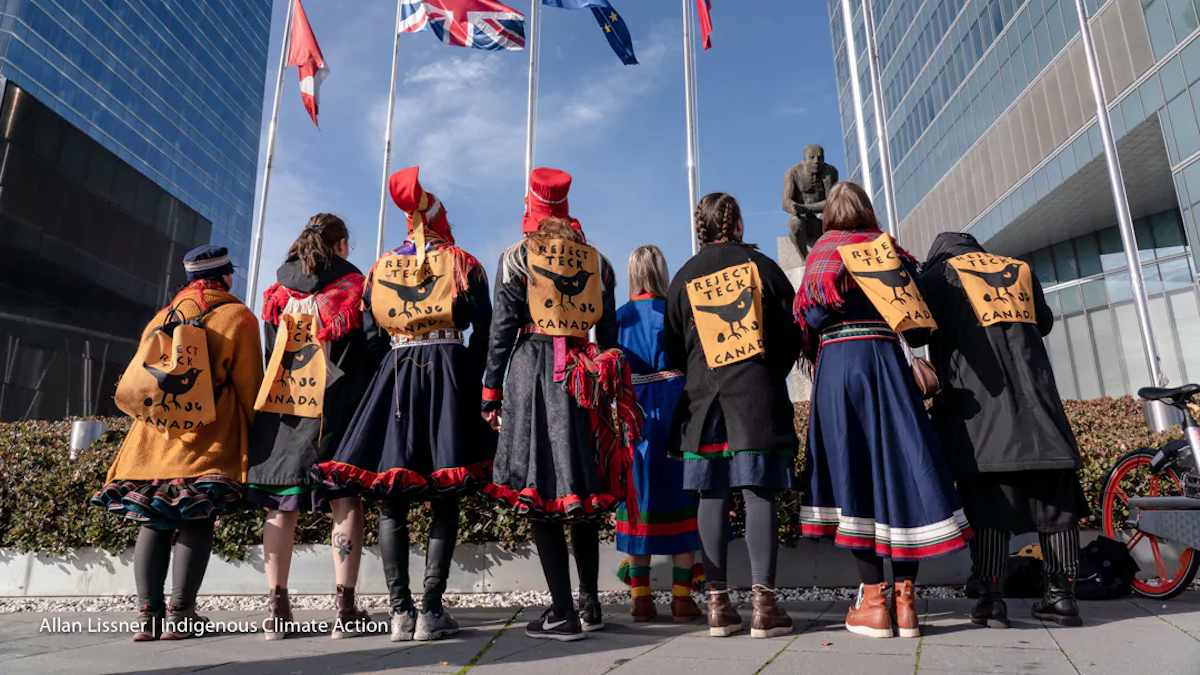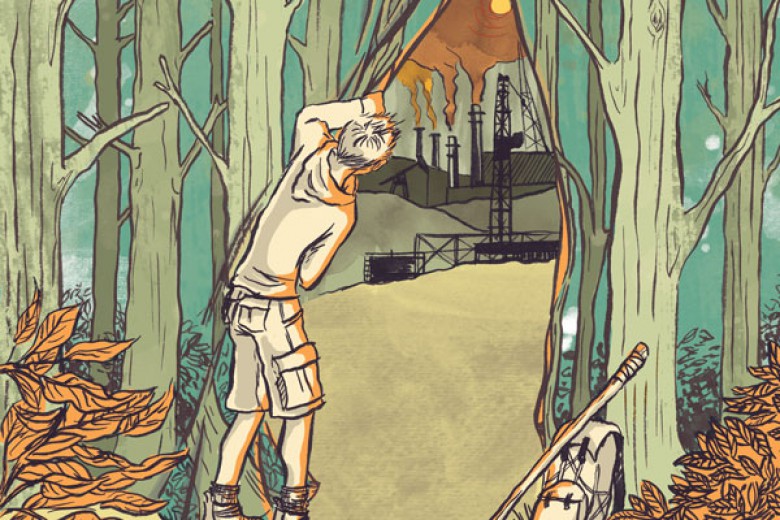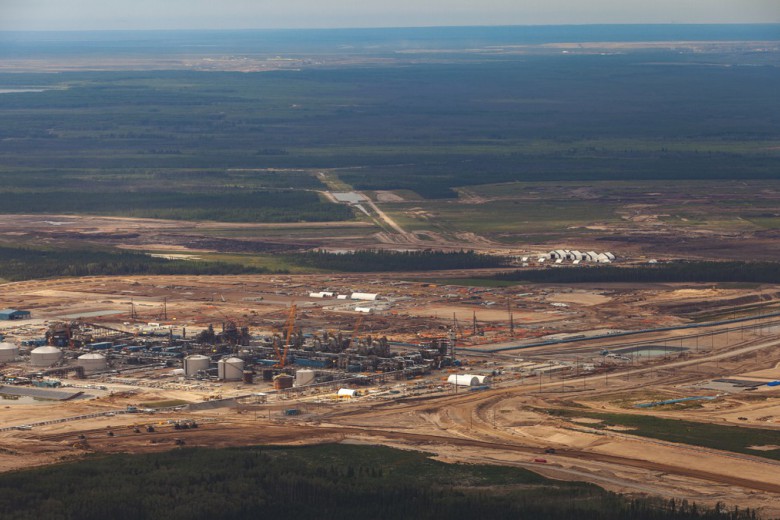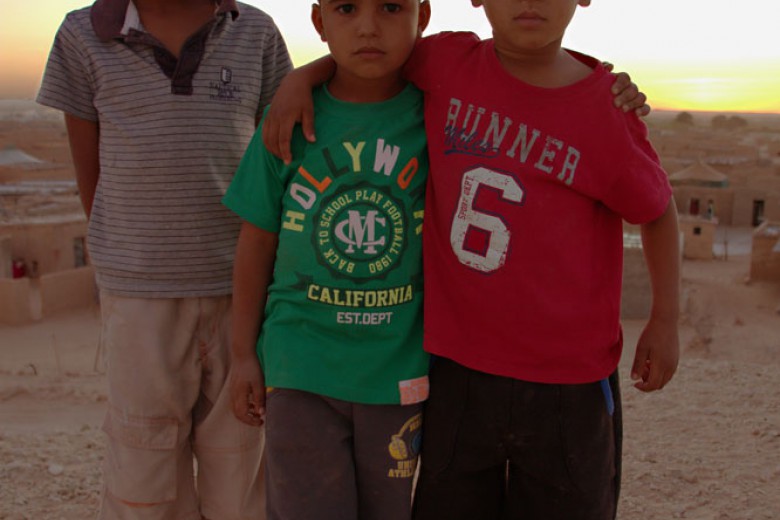The Teck Frontier mine is dead. The $20.6 billion tarsands project, slated to be built on Treaty 8 territory, was shelved on February 24 following uncertainty about its impending federal approval, concerns about regulatory process, and a massive Reject Teck campaign that was spearheaded by Indigenous groups and signal boosted internationally by everyone from Nobel Prize winner Alice Munro to actor Joaquin Phoenix.
Clayton Thomas-Muller, a member of the Mathias Colomb Cree Nation and an organizer with the environmental organization 350.org, won’t call it a death knell for the oil and gas industry in Canada until it comes straight from the top. “It’s only a matter of time, but [Teck being rejected federally would have been] the final nail, that represent[ed] the end of big oil in Canada. But Teck wasn’t rejected. Wherever the pressure came from, [...] they pulled their own application. I think that that was to avoid [federal rejection].”
"But Teck wasn’t rejected. Wherever the pressure came from, [...] they pulled their own application."
The withdrawal of Teck – which would have been the largest-ever open-pit tarsands mine – comes amid a protracted struggle against the Coastal GasLink pipeline, a key piece of what would be Canada’s largest liquid natural gas project. Members of the Wet’suwet’en nation have been blocking construction of the pipeline through their unceded territory, and their blockades have been met by court injunctions that have precipitated the violent removal of land defenders from the territory by the RCMP. Solidarity actions across the country have included ongoing rail blockades, occupations of provincial legislatures, marches, and fundraising campaigns. The total economic loss caused by the rail blockades is estimated to be in the hundreds of millions of dollars.
It’s hard not to imagine that this escalation of direct action played a role in Teck’s decision to withdraw the Frontier Mine application, a project that wouldn’t have begun producing oil until 2026, leaving six years in which the project could have been shut down, been delayed, or ballooned in cost due to a variety of factors, including direct action and legal challenges. In neighbouring Treaty 6 territory, for example, the Beaver Lake Cree Nation has taken the governments of Canada and Alberta to court, arguing that the tarsands violate constitutionally protected treaty rights.
Unceded forever, never surrender
By targeting infrastructure – notably, rail lines which were built to cement the fledgling nation of Canada and facilitate its violent colonization of Indigenous lands – Indigenous land defenders are proving they can #ShutDownCanada. Disrupting the flow of capital is one method that settler climate activists – like school climate strikers and members of Extinction Rebellion – have often shied away from or outright rejected. While actions led by settler groups have helped build the movement, they haven’t forced the kind of reckoning from corporations and governments that Indigenous-led blockades have.
Eriel Tchekwie Deranger is the executive director and co-founder of Indigenous Climate Action, one of the organizations instrumental in the fight against Teck. Deranger is Dënesųłiné from the Athabasca Chipewyan First Nation, at the heart of the tarsands. She explains that Indigenous communities “have both [the] moral principles and values, and the legal foundation to stand on. So when we go onto a rail line in our communities or put a blockade through a tract of our traditional territory, it's much harder for those interventions from the corporation and the government to be enacted because there are legal issues – and long-standing legal issues – that have not been fully addressed or dissected and understood in this country as to how our rights are actualized.”
For example, when Ontario police arrived to serve an injunction to the Mohawks of Tyendinaga, who are blocking a railway on their land in solidarity with Wet’suwet’en, the land defenders burnt the injunction on the tracks in front of police and the media. “We have, and have always had our own laws and customs, prior to, during and thereafter your attempts at genocide and assimilation. A paper ordering us to vacate our land, and or allow passage of foreign goods through our territory is meaningless,” they wrote in a follow-up statement. Tyendinaga Mohawks first blocked rail lines to protest the theft of their land in 1820, while the lines were still under construction.
“The fundamental difference between Oka and now is that people aren't going to ask you for change.”
Prior reporting in Briarpatch has highlighted the failure of settler-driven “negotiated settlements” in regards to land title. By issuing two injunctions to CGL, the B.C. Supreme Court declared that Wet’suwet’en laws are effectively meaningless on their own land, despite Supreme Court acknowledgements that Wet’suwet’en land is unceded.
Indigenous people have been resisting the theft of their lands by the Canadian government and its corporate cronies for generations. The recent standoffs between Indigenous land defenders and militarized police have many drawing parallels to the so-called “Oka crisis” – the military siege on the Mohawk reserve of Kanehsatake in 1990.
“The fundamental difference between Oka and now is that people aren't going to ask you for change,” Deranger explains. “We are saying we don't want you to feel like integrating our rights into the system – but we want to say our rights exist in our lands, in our territories, and you need to abide by them.”
“It’s a paradigm shift”
Both Deranger and Thomas-Muller say that this moment feels like a paradigm shift, something that’s building on a history of Indigenous land defense and culminating in calls for “land back.” Deranger says, “What makes this fundamentally different is that what we're seeing – instead of just one concerted issue with effort and people mobilizing behind that – what we're actually seeing is people utilizing a moment around a particular issue [...] to highlight the multiplicity of issues that exist in the country within Indigenous communities across the nation.“
“In every community you go to that incorporates resistance, grandmothers and mothers are leading grassroots efforts against fossil fuels, against the police state, on a plethora of issues,” says Thomas-Muller, tracing a line to the historic and ongoing movements around justice for Missing and Murdered Indigenous Women and Girls. “People have made the connection that disconnection from the land, in vulnerable communities […] there’s a very direct correlation between man camps that come with mega industrial projects like Coastal Gas Link, like Trans Mountain, and the targeting of Indigenous women and girls. I think that’s a really big trigger point that has echoed throughout this moment.”
Deranger advocates for a multi-pronged approach to resisting colonial land theft that involves direct action, legal challenges, and broad-based solidarity between groups, an approach she calls “everything all at once.”
Deranger adds, “I would say it's a paradigm shift in the way in which this correction of rights is happening now. That coupled with, obviously, technology.” Social media has allowed blockaders to put out calls for supporters and supplies, livestream arrests, fundraise broadly, and quickly rebut mainstream media misinformation. “There’s just a lot of wild factors, with the different types of digital tools that have been added to the activist toolkit on top of old-school base building [and] organizing tools,” Thomas-Muller says. “I think that’s what separates this from Oka or Gustafsen lake.“
When I asked for comment on whether or not grassroots opposition impacted its decision to wtihdraw, Teck referred to its letter to the Minister of Environment and Climate Change. The letter cites the low price of oil, the need for green alternatives, and a “vocal minority” of opposition, but does not address the increasingly disruptive direct actions against resource extraction at all.
Additionally, “there's some real correcting of courses that needs to happen before we can actually say that we've won,” says Deranger. “Yes, Teck pulled out, but there is a long way to go before we address the total systemic failures of the government and the environmental degradation and destruction that has happened from this industry over the last six years.”
Deranger advocates for a multi-pronged approach to resisting colonial land theft that involves direct action, legal challenges, and broad-based solidarity between groups, an approach she calls “everything all at once.”
Indigenous-settler solidarity
As Indigenous land defenders escalate their resistance to resource extraction and colonial violence, we might also see the escalation of long-standing tension between Indigenous land defenders and settler environmental activists. Settler activists have a history of disrespecting Indigenous leadership and knowledge – from PETA vilifying the Inuit seal hunt, to settler activists advocating for national parks that displace Indigenous people from their land. And activists at a Wet’suwet’en solidarity march in Toronto have reportedly been leading anti-oil chants and selling socialist newspapers, derailing the message of a movement that’s primarily about Indigenous sovereignty.
This is not an emergent problem but a persistent one. “I think that environmental groups and Indigenous rights movements have been on a collision course since colonization,” Deranger says. “This isn’t new. […] The collision course between these two groups [is about] exposing the entrenched, deep white supremacy that exists in North America and globally around who has the right answers, and how [settler environmentalists are] willing to cede their power and their positions to be the leaders of this movement, when the real leaders of this movement have always been Indigenous communities fighting for, advocating for, that deep relationship with the land and the ecosystem to not be severed.”
Kenney’s crackdown
The response to Teck’s withdrawal from Alberta’s provincial government has been harsh, with Alberta Premiere Jason Kenney declaring Teck’s withdrawal a result of the rail blockades, precipitated by “urban green left zealots,” who are inadvertently cheating Indigenous communities out of the money and jobs that the mine promised. Oil and gas companies are notorious for inflating the number of jobs their projects will create, and Indigenous communities have struggled to receive any meaningful royalty revenue from oil and gas projects on their lands.
Oil and gas projects supplying Indigenous communities with jobs and royalties is akin to a corporate sponsorship program, one that absolves the Canadian government of any responsibility to Indigenous people whose land it stole. The relative newness of linking Indigenous prosperity to the oil and gas industry is also evidence of our ability to dismantle the industry on Indigenous land. Deranger explains, “It's only been in the last 15 years since [oil and gas companies] were forced into a situation where they had to sign agreements for compensation of losses to [Indigenous] communities. [...] People often think that we've been a part of it, but this entire industry was started without any of our consent or consultation.”
Oil and gas projects supplying Indigenous communities with jobs and royalties is akin to a corporate sponsorship program, one that absolves the Canadian government of any responsibility to Indigenous people whose land it stole.
Kenney also tabled a bill – the Critical Infrastructure Defence Act – which would slap railway blockaders with fines of up to $25,000 per day.
“It’s a scary time,” Deranger says. “What will happen in Canada? What will happen provincially? I don't know. I really hope that we don't get to those violent clashes. But I also know that historically these massive clashes of power are what changed power. And I don't want to say that it's necessary, but this is often the way the story got told.”
Thomas-Muller remains cautiously optimistic, “There’s a fact that is shared among native people, and that is that the settler-colonial state of Canada’s security apparatus can only deal with 14 flashpoints at any given time. Anything above that, and the integrity of their system of control begins to unravel, and they’re forced to compromise. And I think you’re going to see escalations, not just at railways crossings. [...] I think the people connect the dots and realize, immediate direct action gets the goods, especially if it’s coming from a place of honour and connection to the land. [...] I don’t know where it’s going to go, but I’m excited about it.”
Throughout Teck’s withdrawal, the rail blockades for Wet’suwet’en, and the ongoing fight against the Trans Mountain pipeline expansion, one thing is clear: An Indigenous movement is building in this country. It’s a product of a long, violently repressed history. And it’s likely only just beginning.







